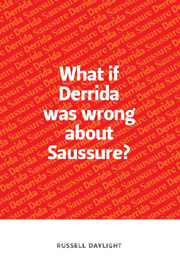Book contents
- Frontmatter
- Contents
- Acknowledgements
- Abbreviations and Textual Notes
- Introduction
- 1 Classical Semiology
- 2 The Originality of Saussure
- 3 The Concept of the Sign
- 4 Writing, Speech, and the Voice
- 5 The Sign as Representation
- 6 Linguistic Identity
- 7 The Sign and Time
- 8 The Horizon of Language
- Conclusion
- List of Works by Derrida and Saussure
- References
- Index
Introduction
Published online by Cambridge University Press: 12 September 2012
- Frontmatter
- Contents
- Acknowledgements
- Abbreviations and Textual Notes
- Introduction
- 1 Classical Semiology
- 2 The Originality of Saussure
- 3 The Concept of the Sign
- 4 Writing, Speech, and the Voice
- 5 The Sign as Representation
- 6 Linguistic Identity
- 7 The Sign and Time
- 8 The Horizon of Language
- Conclusion
- List of Works by Derrida and Saussure
- References
- Index
Summary
On 21 October 1966, Jacques Derrida presented ‘Structure, Sign, and Play in the Discourse of the Human Sciences’ to the International Colloquium on Critical Languages and the Sciences of Man, at Johns Hopkins University, Baltimore. According to its organisers, the conference ‘sought to explore the impact of contemporary “structuralist” thought on critical methods in humanistic and social studies’ (Macksey and Donato 1972a: xv), and was ‘the first time in the United States that structuralist thought had been considered as a cross-disciplinary phenomenon’ (xvi). The invited speakers were drawn from the fields of ‘anthropology, classical studies, comparative literature, linguistics, literary criticism, history, philosophy, psychoanalysis, semiology, and sociology’ (xvii); among them were Jacques Lacan, Roland Barthes, Tzvetan Todorov, and René Girard. The ambition of the conference was to identify the basic problems of the structuralist approach, such as ‘the status of the subject’, ‘the general theory of signs and language systems’, and ‘synchronic (vs.) diachronic descriptions’, with a view to determining ‘the prospects for interdisciplinary co-operation’ (xvi). In brief, the event was scripted as the launch of French structuralism in America.
By the time Richard Macksey had made his ‘Concluding Remarks’ to the conference, however, there was already a sense of uncertainty about structuralism's future; a future that had seemed so assured only four days before. In particular, Macksey observed that: ‘The sessions have allowed us … to investigate contending interpretative models, and to consider such radical reappraisals of our assumptions as that advanced by M. Derrida on this final day’ (Macksey 1972: 320).
- Type
- Chapter
- Information
- What if Derrida was wrong about Saussure? , pp. 1 - 18Publisher: Edinburgh University PressPrint publication year: 2011



